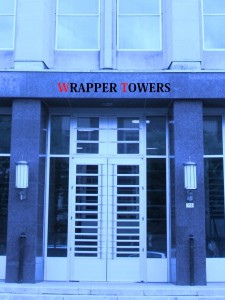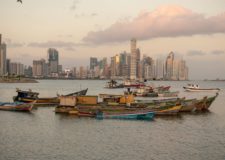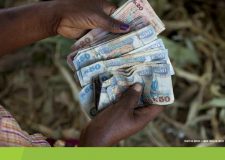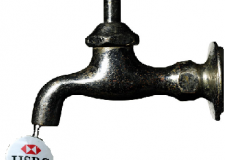Gulliver’s circuitous travels
More details of HSBC account holders continue to emerge. The latest embarrassing tale concerns Stuart Gulliver, the CEO of the godawful bank.
Born in Derby, England, and educated in lush, leafy Devon, he now works in London. But despite his obvious English roots, Gulliver is reportedly registered as non-domiciled for tax purposes in the UK. It is easy to do this if you’re rich: all the evidence shows that Britain is deliberately turning a blind eye to this wicked game, making obsequious donations of the kitchen sink to the world’s wealthiest people, for no obvious reason at all.
Furthermore, it seems Gulliver isn’t actually employed by HSBC in the UK, but has been seconded from HSBC Asia Holdings, based in the Netherlands.
He did previously work in Hong Kong. While there, his bonus was paid to a bank account in HSBC Switzerland. That bank account is controlled by company called Worcester Equities Inc., an anonymous company registered in Panama.
Under scrutiny, our man has stoutly defended his actions. The complicated payment structure, in which Gulliver’s bonuses went to the Panama company’s Swiss bank account, was simply a way to prevent his colleagues in Hong Kong and Switzerland finding out how much he was paid.
HSBC Chairman Douglas Flint said that “There is absolutely no story here” “There is nothing that Stuart has done that is not absolutely transparent, legal and appropriate.”
Bill Black replies, with a deftly aimed skewer:
Thank you, Mr. Flint, for demonstrating why relying on a board of directors chosen by the CEO to supposedly keep bad CEOs on the right track results in recurrent, unintentional self-parody. Combining Panama and Swiss tax havens to ensure secrecy is the new “transparent” in banking.
Indeed. Emma Thompson would be on Mr. Black’s side on this one. Her and her husband Greg Wise, brave souls, are going to get into trouble for this.
Sun, sea, secrecy and Sovereign
The ICIJ has published a story looking at a company formation agent called Sovereign. The company openly and unashamedly offers tax avoidance services to people, including setting up anonymous shell companies in various tax havens.
Unashamedly, because the website says about tax avoidance:
“There is nothing immoral in trying to protect your hard earned assets…. It is the essence of rational self-interest.”
“What we advocate is not illegal; it therefore does not attract undue attention from the authorities.”
Hmmmm. Apparently the authorities in the US take a different view.
The IRS and prosecuting authorities have filed a petition seeking disclosure about customers of Sovereign after they have identified a number of criminal transactions using the firm.
However, Sovereign is at least a bit more honest when it comes to tax havens.
As we well know, according to tax havens and many financial institutions that work in tax havens, tax havens don’t exist. They are of course all co-operative, well regulated, cough cough, transparent financial centres. The world’s hot money hates a taint, and there’s no better way to dispel that sour taste in the mouth than with a minty-fresh blast of . . . spin. That good old theatre of probity.
Sovereign on the other hand, tells it like it is. On Panama where company formation costs $1350, the company’s website says:
“Once regarded as the Western Hemisphere’s primary financial and trading tax haven, Panama’s status as a banking and free trade zone sanctuary was severely curtailed in the late 1980’s because of the infamous Noriega affair. Panama has since recaptured its prominent position as one of the most attractive and successful offshore jurisdictions.”
On the Seychelles, Sovereign gushes:
“Looking for tax haven with a solid secrecy policy and attractive offshore business laws? Seychelles may be perfect for your next offshore company formation.”
Well regulated, co-operative and transparent, indeed. Paradise for a few.
Turks and Caicos Islands: you most definitely are a tax haven
Speaking of places which are definitely not tax havens, the Turks and Caicos Islands is none too pleased with Ed Miliband, the UK leader of the Opposition, labelling of the country as a tax haven.
Rufus Ewing, the Turks and Caicos chief minister, has issued a statement in response to Miliband’s recent communication. Though Ewing says he hasn’t seen the Labour leader’s announcement, he takes exception to his jurisdiction being dubbed a tax haven.
He added that
“the TCI is a well regulated and compliant financial services jurisdiction that has complied with the FATF Standards, Global Forum Standards and have signed numerous Tax Information Exchange Agreements (TIEAs), including the US-FATCA, UK-FATCA and multilateral agreement on automatic exchange of information in Berlin on 29 October 2014, among numerous others agreements.”
So let’s take a peek at the size of TCI’s commitment to global transparency initiatives? According to lowtax.com the Turks and Caicos Islands has 13,000 foreign exempt companies. As the website says:
“The attraction of the Exempt Company lies in a combination of its tax exempt status and minimal disclosure and administrative requirements.”
In particular the country allows bearer share corporations, which are companies where the shareholders are completely unregistered and unknown perhaps even to the company itself. Ownership is in the form of a transferable certificate.
Further goodies for overseas businesses is that in the Turks & Caicos they can also apply for an exemption from taxes on the islands for up to 50 years.
Definitely not a tax haven then.
Just what is it about Malta that the super-rich love so much?
Last year Malta opened up a new scheme to allow foreigners to buy citizenship. For a contribution of a mere €650,000 to the Maltese social fund, the wealthy from around the world can become full citizens of the European Union.
One year in and the Maltese parliament has just published a review of its “Individual Investor Scheme”.
A total of 173 applications have been received with 54% from Russia and 30% from Asia earning the Mediterranean island a potential €112m windfall.
So why are these “investors” flocking to Malta? Might it have something to do with Malta’s favourable tax rates?
Do you need to ask?
In Malta, there are no taxes on capital gains, wealth taxes, no transfer taxes, stamp duties or withholding taxes on investment income.
Malta advertises itself to high net worth individuals as having a Mediterranean life style with an Anglo Saxon work ethic.
Perhaps that should read: “They work so you don’t have to.”
Osborne in ‘competitive decriminalisation for the super-rich’ shocker
Among the salient lessons of SwissLeaks is that the UK authorities did almost nothing to apprehend tax evaders even after they were told that a major international bank was systemically helping British citizens hide billions in assets offshore.
So one might expect the UK government to at least try to come up with a good excuse.
Stand by for some disappointment.
Last week, the UK Chancellor of the Exchequor, George Osborne said that it isn’t his job to go after tax cheats.
“I don’t think it would be right – and actually when you pause to think about it I think most people would agree – I don’t think it would be right for a chancellor of the exchequer to direct prosecutions against individuals or individual companies,” he said.
Let’s ponder that for a second.
While it would be inappropriate for politicians to direct prosecutions against individuals, that is hardly the issue here.
Osborne, as a government minister, is responsible for government policy and it is this government’s policy not to prosecute those engaging in illegal tax evasion with secret Swiss bank accounts.
No one was asking Mr Osborne why person X or Y with a Swiss bank account wasn’t prosecuted.
The question was why the government set up a system to allow everyone engaged in illegal tax evasion off the hook. Including with this corrupt, discredited whitewash.
It’s a question of particular importance given the zeal with which the government pursues those who make fraudulent benefit claims.
Most people would agree that ministers are mad not insisting that the prosecution authorities use all the tools available to them to pursue the rich engaging in tax evasion.
One might call it “competitive decriminalisation for the super-rich.” A sport at which British governments, led through the nose by large offshore-diving banks, excels.






Leave a Reply